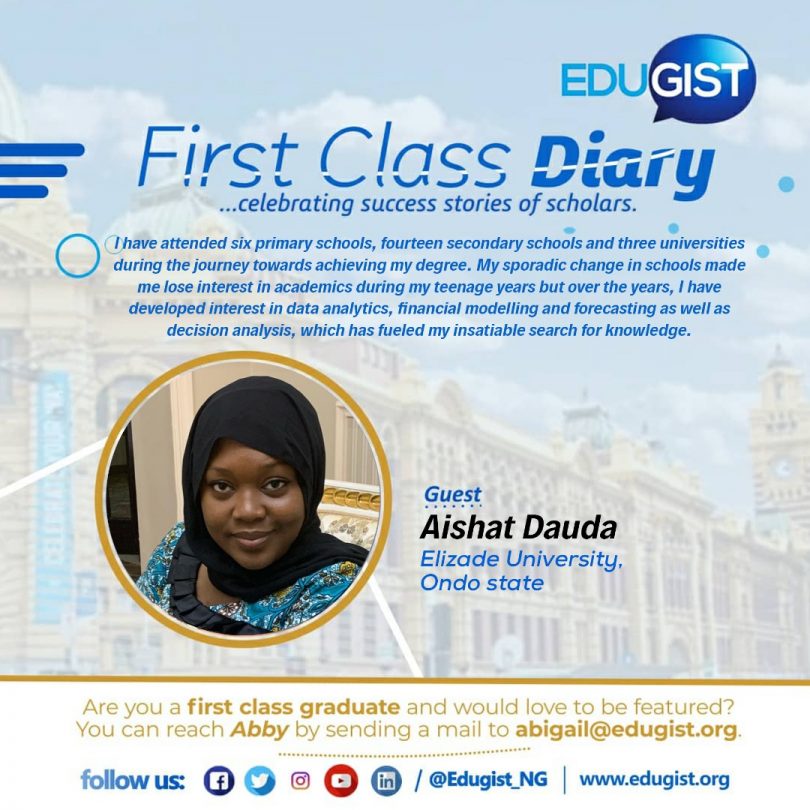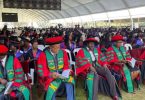Abigael Ibikunle of Edugist: Please tell us a little about your background?
Aishat Dauda: My name is Aishat Dauda, a 22-year-old Hausa woman from Kaduna state, Nigeria. I am a first-class graduate of Economics from Elizade University, Ondo State, Nigeria. Interestingly, I am the first of fifteen children in my family with a passion for cooking, research and writing.
I have attended six primary schools, fourteen secondary schools and three universities during the journey towards achieving my degree. My sporadic change in schools made me lose interest in academics during my teenage years. But, over the years, I have developed an interest in data analytics, financial modelling and forecasting as well as decision analysis. All these fuelled my insatiable search for knowledge.
AI: Was there any motivating factor(s) that influenced your choice of discipline and institution?
AD: Having attended several schools all over the world, I found that the environment back home was not as favourable as other countries I’ve lived in. I was curious to know what causes such disparity between third world nations such as Nigeria and first-world nations like the United States.
Economics helps us to understand these differences and how to combat such economic backwardness. Elizade university provided an environment where learning was made easy and enjoyable. Such a serene environment allowed me to develop my research skills and social skills. With the necessary tools at my disposal, I was always engaged because with every question answered, I had twice as more.
AI: There are two major skills that every student must possess: COMPETENCE and PERFORMANCE. While competence revolves around skill acquisition, performance is much more concerned about skills application. It is believed that most graduates are competent because their academic performance testifies to this, but they are performance-challenged. This poor performance ipso facto hinders them from getting lucrative jobs in the labour market. What can you say about this assertion?
AD: This can be attributed to the nature of the learning process in our educational system. It is not enough to understand a problem, it is necessary to know how to solve it and actualize that plan. In the workplace, you are a problem-solver and thus theory must be put in practice.
AI: What do you think is responsible for competence without performance? Please suggest ways of improving the performance level of university students and graduates.
AD: This is where I appreciate Elizade University, we weren’t just being told what the problem was, we were challenged to solve them. An example of activity myself and my course mates took on, was the Elizade University Community Service Project (EU-CSP).
This project was aimed at putting in an effort towards solving the issues of a flawed educational system by partaking in the United Nations Sustainable Development Goals (SDGs). Things like this make a difference, they make you stand out.
AI: Achievement in life transcends one’s personal efforts. There were people who, during your programme, rendered some assistance that made your dreams a reality. Who are specific persons whose contribution you can’t forget in your first-class feat?
AD: First of all, I had a great support system from home.
With my parents constantly cheering me on, I felt unstoppable. My second support system was on campus. With a tremendous group of friends and lecturers, I was able to have the confidence and zeal necessary to keep pushing myself even when things got tough.
AI: As a first-class graduate, are you currently gainfully employed?
AD: In Nigeria, one cannot be legally employed without having NYSC certificate. The pandemic has disrupted the world economy and social norms. This has in turn put several opportunities I have on hold.
However, this new year has been great to me so far. Hopefully, once I begin my NYSC I can be able to take up one or two opportunities I have waiting for me.
AI: Do you think your grades have or is giving you any major advantage over other graduates with lesser grades?
AD: Being a first-class graduate made it easy to get through so many doors of employers. Having that result is the first thing you need to stand out of the crowd. And if you truly merit it, your performance in the workplace would speak for you.
Similarly, my first-class degree has gotten me several scholarship opportunities. I took one up and was to resume last year in September but because of the pandemic, I had to forgo the scholarship for the year. Without such an exceptional result, I really do not believe I would have been able to achieve some (if not all) of these things.
AI: For students who aspire to graduate with an outstanding grade like yours, what would you advise them?
AD:
It is not enough to work hard, you would have to work SMART (Specific, Measurable, Achievable, Relevant and Time-based). Often times, students try to replicate other first-class products’ experience but they fail to understand that everyone’s experience is unique to themselves. You need to also develop a framework that fits your background and aspirations.
Such an example would be choosing an appropriate study method that works for you. Are you an auditory learner? A visual learner? Or perhaps you a one that retains information by writing or reading aloud. My advice in one sentence would be
You need to understand who you are, where you’re coming from and where you’re heading. So that you may be the best version of yourself and rise through the ranks confidently, comfortably and conveniently.
AI: What would you advise the government to do to improve the standard of our education system?
AD: One comment that has been thrown at me severally over the past few months is
‘‘If you had attended a public university, you can never dream of finishing with a first-class degree. Come and attend universities like OAU, UI, UNIBEN, then we can consider your degree valid.’’
My lack of unnecessary suffering during the course of my degree does not invalidate my academic achievement. I started my degree at a public university and immediately transferred to a private university due to the strike.
Our educational system has become so inferior and backwards that a measure of brilliance and academic excellence has become “how much suffering and wasteful years it took to achieve that degree.”
If public schools in Nigeria were any better than the private schools others attend, issues such as; lecturers not showing up until the end of the semester or even the issues of academic calendars being carried over to another year (Like in the case of UNIBEN starting its 2019 academic session in 2021) would not exist.
Similarly, things like taking more than 10 courses per semester are redundant, overwhelming and unnecessary. I personally during the course of my studies took 12 courses in a semester. The government needs to restore the educational sectors to its glory days by reviewing its curriculum and aligning it to our societal needs and international standards.
AI: Any other thing you would like to share?
AD: With regards to gaining employment after schools, students make the mistake of believing that in Nigeria the only way to get somewhere is by knowing someone or someone who knows someone. This is not always the case. There are media such as LinkedIn at our disposal. Such platform helps you expand your network and bridges the gap between employers and job searchers.
Utilize such media, grow your network and actively chase any opportunity that comes your way.
Do not wait for that somebody that knows somebody because chances are that they are using your CV as a rough sheet. If you’re unlucky, it could be used as a takeaway pack for a roadside Akara seller.
That’s it on the series for the Month. Hope you had a swell time reading? You can read the last interview here
To be featured on the series, please send a mail to Abby
I am Abigael Ibikunle and celebrating excellence is a top priority for me. See you next month!
iTeach, iSpeak, iTrain, iFacilitate, iWrite, iInterview and iLoveYou all. Smile! See you next week!








